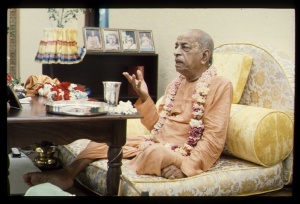SB 5.18.3: Difference between revisions
No edit summary |
(Vanibot #0054 edit - transform synonyms into clickable links, which search similar occurrences) |
||
| Line 23: | Line 23: | ||
<div class="synonyms"> | <div class="synonyms"> | ||
''aho'' | ''[//vanipedia.org/wiki/Special:VaniSearch?s=aho&tab=syno_o&ds=1 aho]'' — alas; ''[//vanipedia.org/wiki/Special:VaniSearch?s=vicitram&tab=syno_o&ds=1 vicitram]'' — wonderful; ''[//vanipedia.org/wiki/Special:VaniSearch?s=bhagavat&tab=syno_o&ds=1 bhagavat]-[//vanipedia.org/wiki/Special:VaniSearch?s=viceṣṭitam&tab=syno_o&ds=1 viceṣṭitam]'' — the pastimes of the Lord; ''[//vanipedia.org/wiki/Special:VaniSearch?s=ghnantam&tab=syno_o&ds=1 ghnantam]'' — death; ''[//vanipedia.org/wiki/Special:VaniSearch?s=janaḥ&tab=syno_o&ds=1 janaḥ]'' — a person; ''[//vanipedia.org/wiki/Special:VaniSearch?s=ayam&tab=syno_o&ds=1 ayam]'' — this; ''[//vanipedia.org/wiki/Special:VaniSearch?s=hi&tab=syno_o&ds=1 hi]'' — certainly; ''[//vanipedia.org/wiki/Special:VaniSearch?s=miṣan&tab=syno_o&ds=1 miṣan]'' — although seeing; ''[//vanipedia.org/wiki/Special:VaniSearch?s=na&tab=syno_o&ds=1 na] [//vanipedia.org/wiki/Special:VaniSearch?s=paśyati&tab=syno_o&ds=1 paśyati]'' — does not see; ''[//vanipedia.org/wiki/Special:VaniSearch?s=dhyāyan&tab=syno_o&ds=1 dhyāyan]'' — thinking about; ''[//vanipedia.org/wiki/Special:VaniSearch?s=asat&tab=syno_o&ds=1 asat]'' — material happiness; ''[//vanipedia.org/wiki/Special:VaniSearch?s=yarhi&tab=syno_o&ds=1 yarhi]'' — because; ''[//vanipedia.org/wiki/Special:VaniSearch?s=vikarma&tab=syno_o&ds=1 vikarma]'' — forbidden activities; ''[//vanipedia.org/wiki/Special:VaniSearch?s=sevitum&tab=syno_o&ds=1 sevitum]'' — to enjoy; ''[//vanipedia.org/wiki/Special:VaniSearch?s=nirhṛtya&tab=syno_o&ds=1 nirhṛtya]'' — burning; ''[//vanipedia.org/wiki/Special:VaniSearch?s=putram&tab=syno_o&ds=1 putram]'' — sons; ''[//vanipedia.org/wiki/Special:VaniSearch?s=pitaram&tab=syno_o&ds=1 pitaram]'' — the father; ''[//vanipedia.org/wiki/Special:VaniSearch?s=jijīviṣati&tab=syno_o&ds=1 jijīviṣati]'' — desires a long life. | ||
</div> | </div> | ||
Latest revision as of 22:09, 18 February 2024

A.C. Bhaktivedanta Swami Prabhupada
TEXT 3
- aho vicitraṁ bhagavad-viceṣṭitaṁ
- ghnantaṁ jano 'yaṁ hi miṣan na paśyati
- dhyāyann asad yarhi vikarma sevituṁ
- nirhṛtya putraṁ pitaraṁ jijīviṣati
SYNONYMS
aho — alas; vicitram — wonderful; bhagavat-viceṣṭitam — the pastimes of the Lord; ghnantam — death; janaḥ — a person; ayam — this; hi — certainly; miṣan — although seeing; na paśyati — does not see; dhyāyan — thinking about; asat — material happiness; yarhi — because; vikarma — forbidden activities; sevitum — to enjoy; nirhṛtya — burning; putram — sons; pitaram — the father; jijīviṣati — desires a long life.
TRANSLATION
Alas! How wonderful it is that the foolish materialist does not heed the great danger of impending death! He knows that death will surely come, yet he is nevertheless callous and neglectful. If his father dies, he wants to enjoy his father's property, and if his son dies, he wants to enjoy his son's possessions as well. In either case, he heedlessly tries to enjoy material happiness with the acquired money.
PURPORT
Material happiness means to have good facilities for eating, sleeping, sexual intercourse and defense. Within this world, the materialistic person lives only for these four principles of sense gratification, not caring for the impending danger of death. After his father's death, a son tries to inherit his money and use it for sense gratification. Similarly, one whose son dies tries to enjoy the possessions of his son. Sometimes the father of a dead son even enjoys his son's widow. Materialistic persons behave in this way. Thus Śukadeva Gosvāmī says, "How wonderful are these pastimes of material happiness transacted by the will of the Supreme Personality of Godhead!" In other words, materialistic persons want to commit all kinds of sinful activities, but without the sanction of the Supreme Personality of Godhead, no one can do anything. Why does the Supreme Personality of Godhead permit sinful activities? The Supreme Lord does not want any living being to act sinfully, and He begs him through his good conscience to refrain from sin. But when someone insists upon acting sinfully, the Supreme Lord gives him the sanction to act at his own risk (mattaḥ smṛtir jñānam apohanaṁ ca (BG 15.15)). No one can do anything without the sanction of the Lord, but He is so kind that when the conditioned soul persists in doing something, the Lord permits the individual soul to act at his own risk.
According to Śrīla Viśvanātha Cakravartī Ṭhākura, sons always outlive their fathers in other planetary systems and other lands in this universe, especially on Svargaloka. However, on this planet earth a son often dies before his father, and the materialistic father is pleased to enjoy the possessions of his son. Neither the father nor the son can see the reality—that both of them are awaiting death. When death comes, however, all their plans for material enjoyment are finished.